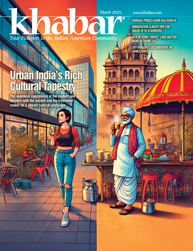Talk Time: Reel Stories on Marriage Matters

Filmmakers Sarita Khurana (left) and Smriti Mundhra didn’t find a mass exodus from the arranged marriage system.
Smriti Mundhra’s latest film, A Suitable Girl, co-directed with Sarita Khurana, had its world premiere at the 2017 Tribeca Film Festival. It focuses on three Indian young women struggling to maintain their identities and follow their dreams amid intense pressure to get married. Like her late father, the filmmaker Jagmohan Mundhra, Smriti has won acclaim for her work. A Suitable Girl is available on Amazon Prime Video, Google Play, and iTunes.
Arranged marriage is one of those subjects that
has been covered extensively. What were you hoping
to bring to the table that hadn’t been done before?
I completely agree that it's really well-worn
territory, especially for South Asian people. But I had
not seen much that looked at it from the hearts and
minds of young women who are actually going through
the process, looking at it as a rite of passage, as opposed
to simply examining the circumstances of arranged
marriage. The film that we were trying to make was
more about this very critical transition in the lives of
young women coming of age and how that impacts
them and their families.
How did your upbringing color what you brought
to the table?
I was raised partly in Los Angeles and Mumbai.
My co-director and I both have an outside and inside
perspective. In one sense we are South Asian women,
so there is a natural point of connection and trust with
our subjects because we have a cultural sensitivity. And
we can start from a deeper place than somebody who
is completely outside of the culture would be able to do.
But we did not go through this process in the way that
young women, in at least the segment of society that
we really focused on, do. We were able to look at this
with a bit of objectivity and really walk that fine line.
Hopefully people find that effective.
How did you get these three women to share
their stories?
The ongoing building of trust and access took time
because, you know this as well as I do, this is a very
sensitive time in people's lives. So it took some building
of trust for them to really feel comfortable and open
up to us in the way that we needed. And that's why
we shot the film for four years because it's not gonna
happen on a short schedule. It's the kind of thing where
you have to show up and show up and show up. That's
why it takes time. But I don't think you can get that kind
of result without it. It's very rare for Indian families to
open up like that to relative strangers, you know?

What was the one thing that surprised you the
most as you made the movie? Did anything stand out
that was unexpected?
You can't make any statement that speaks to all
of India, obviously. We very specifically focused on the
urban middle class and upper middle class, because
that's where young women especially are seeing
so much change, especially in this generation with
access to education and globalization and financial
independence and all of that. We really wanted to see
what would become of the system of arranged marriage
once the women become more liberated in a sense.
That was our starting point. And when you start there,
you do somewhat expect that you go in and see that
young women will start saying, "Oh, we're not doing
this. I'm not gonna get married at 24, 25. I'm financially
independent. I can call more of the shots now." We just
expected to see a little bit more resistance to these
cultural norms and roles. What we found instead was
that the vast majority of young people still believe in, or
at least still ascribe to the arranged marriage process.
So it's not like a mass exodus from that.
I lost my father while we made the film and the value of being part of a community and part of a system became very clear to me. We often talk about social structures and constructs as being oppressive to women and unfair and outdated. And to a certain extent that is still very true, there's no denying that. The arranged marriage system still requires the most sacrifice and compromise from women and we're very clear on that point. But we have a basic human need, to want to belong to a community of some kind. I really felt the value of that after I lost my father. Because there was a support system that just was immediately available to me and sprung up around me. It really helped me see the value in culture and community and rituals. It made me look at the process that we were documenting in a new light.

Poornima Apte is a Boston-area freelance writer and editor. Learn more at WordCumulus.WordPress.com.
Enjoyed reading Khabar magazine? Subscribe to Khabar and get a full digital copy of this Indian-American community magazine.
blog comments powered by Disqus












